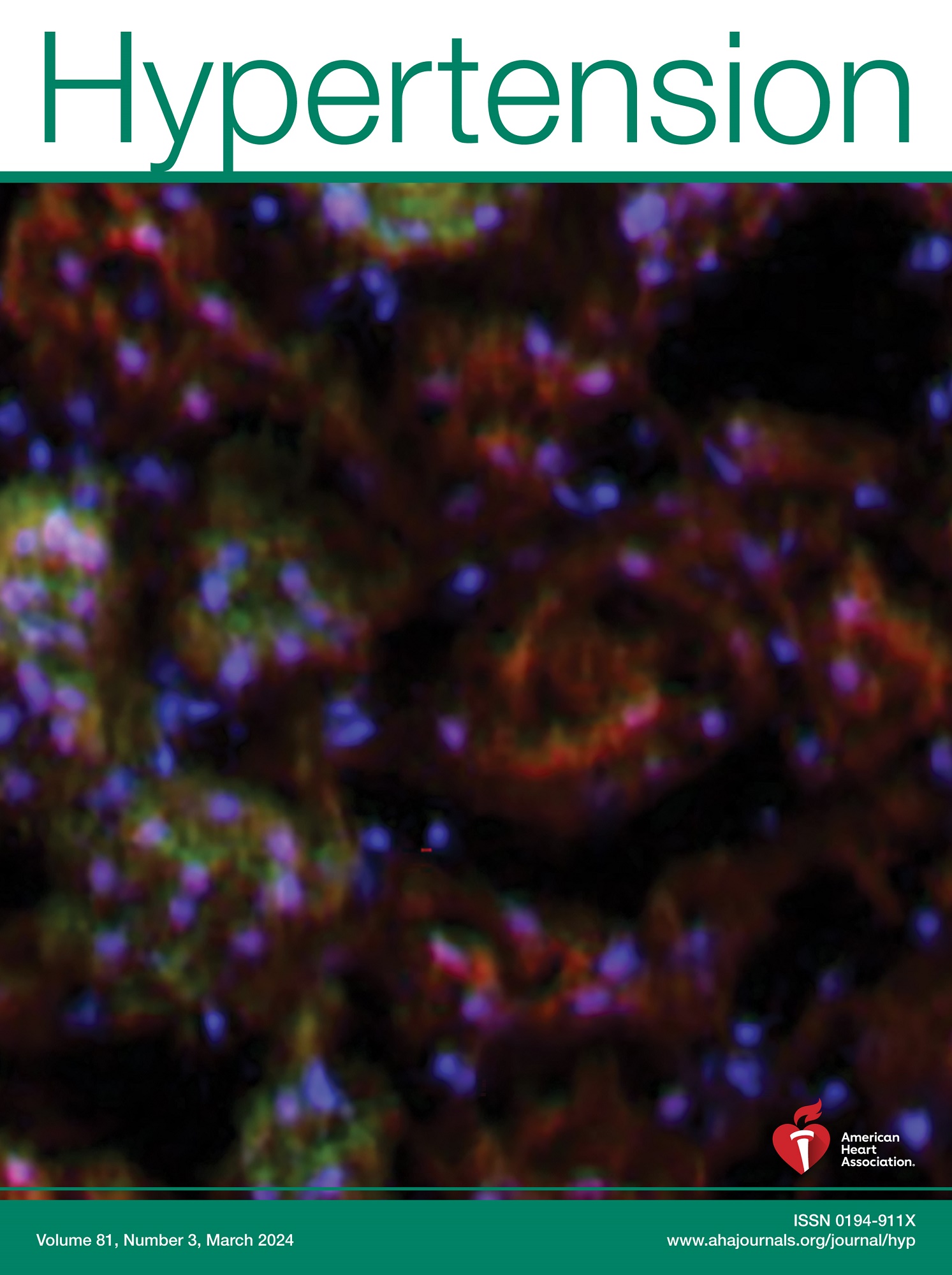Chronic ACTH Infusion Alters the Diurnal Rhythm of Sodium Excretion, Inducing Nondipping Blood Pressure and Salt-Sensitivity in Male Mice.
IF 8.2
1区 医学
Q1 PERIPHERAL VASCULAR DISEASE
引用次数: 0
Abstract
BACKGROUND Cushing syndrome causes hypertension and increased cardiovascular risk. The hypertensive mechanisms are not clearly defined. We hypothesized that glucocorticoid excess would induce salt-sensitivity, reflecting an impaired pressure-natriuresis response and abnormal salt handling by the kidney. METHODS We modeled Cushing syndrome in male C57BL/6J mice with prolonged adrenocorticotropic hormone (ACTH) infusion and measured blood pressure on a control diet and following high-salt intake. In a separate group, we assessed renal function and salt excretion, the in vivo pressure-natriuresis response, and ex vivo artery function. RESULTS ACTH infusion increased blood pressure, induced nondipping and caused a transition to salt-sensitivity. ACTH infusion reduced the urine sodium/potassium ratio and abolished the diurnal rhythm of sodium excretion. In isolated renal artery, the response to nitric oxide was diminished, and at the mRNA level, we found evidence of arterial remodeling and enhanced TGF-β (transforming growth factor beta) signaling. Autoregulation of renal blood flow was impaired, as was the pressure-natriuresis response. CONCLUSIONS ACTH infusion impairs sodium excretion and causes a transition to nondipping and salt-sensitive blood pressure. Renal hemodynamic and tubular abnormalities impair the pressure-natriuresis response. Our findings provide a landscape of the complex physiological response to ACTH excess that may contribute to poor cardiovascular health in Cushing syndrome.慢性ACTH输注改变雄性小鼠钠排泄的昼夜节律,诱导非浸入性血压和盐敏感性。
背景:库欣综合征导致高血压和心血管风险增加。高血压的发病机制尚不明确。我们假设糖皮质激素过量会引起盐敏感性,反映出压力-钠尿反应受损和肾脏对盐的异常处理。方法长期注射促肾上腺皮质激素(ACTH)的雄性C57BL/6J小鼠建立库欣综合征模型,并在对照组饮食和高盐摄入后测量血压。在另一个单独的组中,我们评估了肾功能和盐排泄,体内压力-钠尿反应和体外动脉功能。结果sacth输注使血压升高,诱导不浸渍,并导致向盐敏感过渡。ACTH输注降低了尿钠钾比,取消了钠排泄的昼夜节律。在离体肾动脉中,对一氧化氮的反应减弱,在mRNA水平上,我们发现动脉重塑和TGF-β(转化生长因子β)信号传导增强的证据。肾血流的自动调节功能受损,压力-尿钠反应也受损。结论sacth输注可影响钠排泄,使血压向非浸渍性盐敏感型转变。肾血流动力学和肾小管异常损害压力-钠尿反应。我们的研究结果提供了对ACTH过量的复杂生理反应的景观,ACTH过量可能导致库欣综合征心血管健康状况不佳。
本文章由计算机程序翻译,如有差异,请以英文原文为准。
求助全文
约1分钟内获得全文
求助全文
来源期刊

Hypertension
医学-外周血管病
CiteScore
15.90
自引率
4.80%
发文量
1006
审稿时长
1 months
期刊介绍:
Hypertension presents top-tier articles on high blood pressure in each monthly release. These articles delve into basic science, clinical treatment, and prevention of hypertension and associated cardiovascular, metabolic, and renal conditions. Renowned for their lasting significance, these papers contribute to advancing our understanding and management of hypertension-related issues.
 求助内容:
求助内容: 应助结果提醒方式:
应助结果提醒方式:


